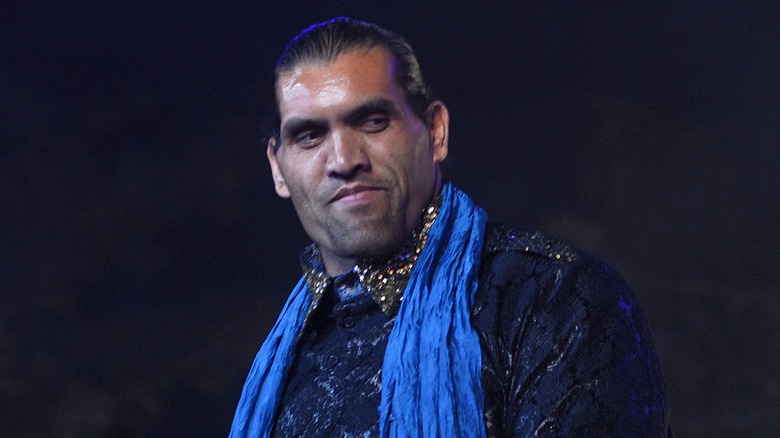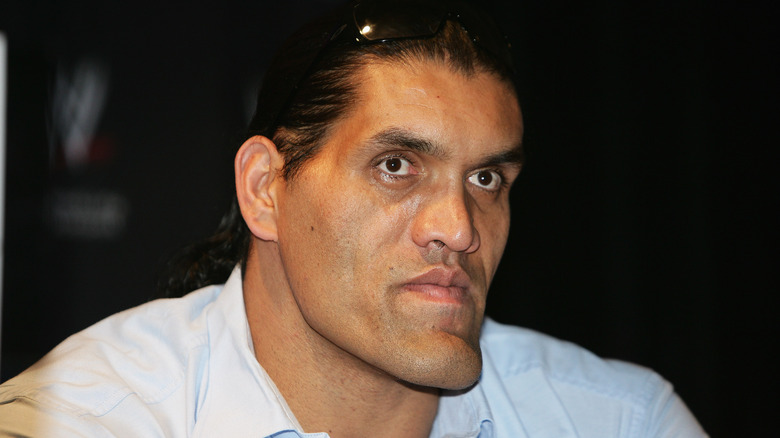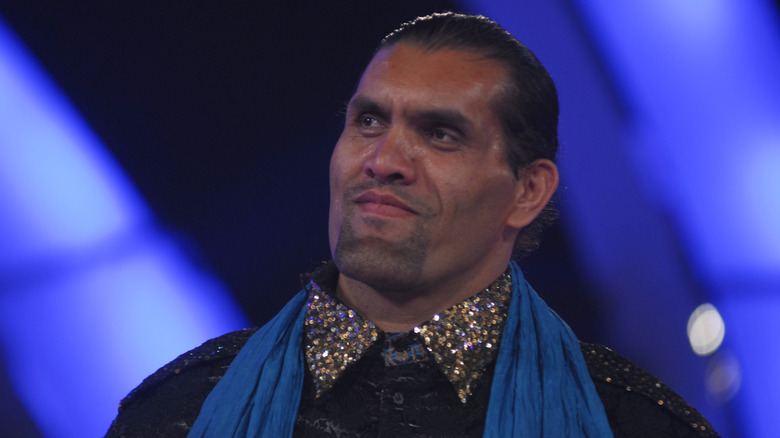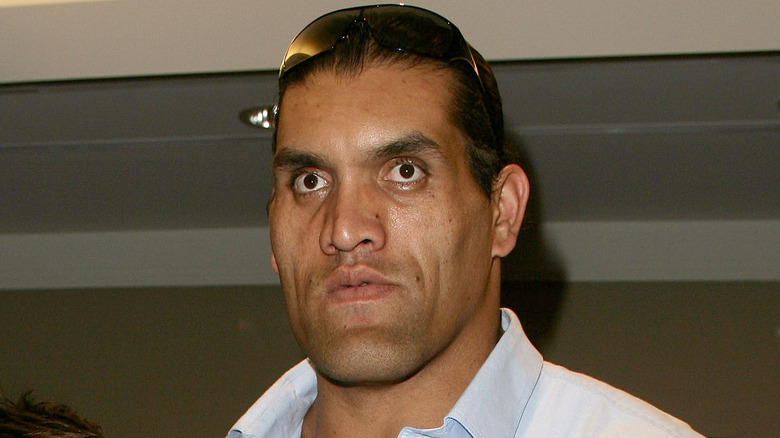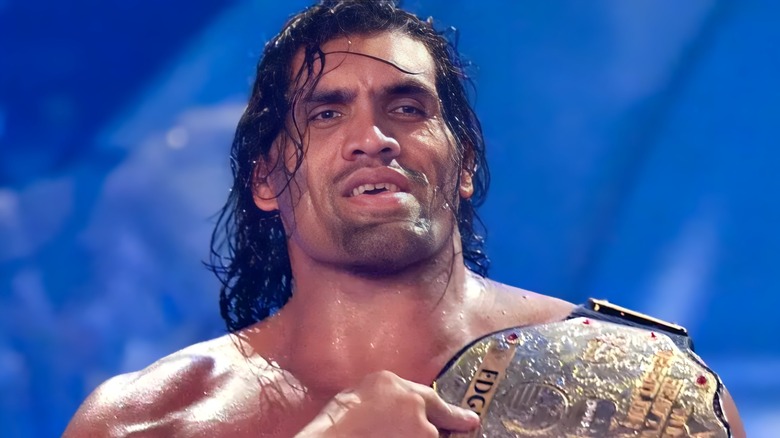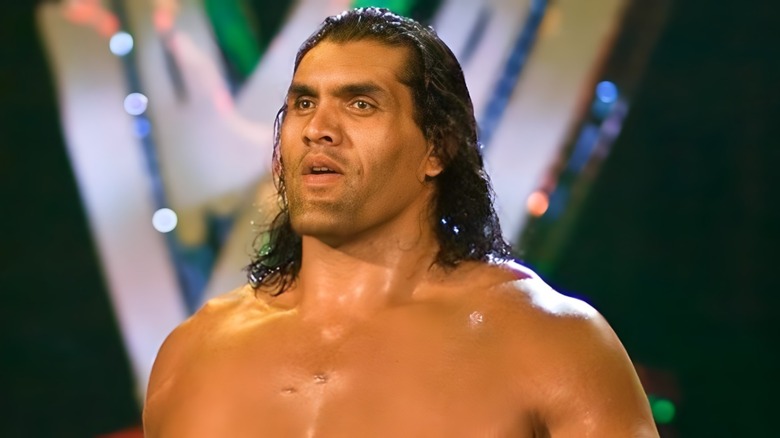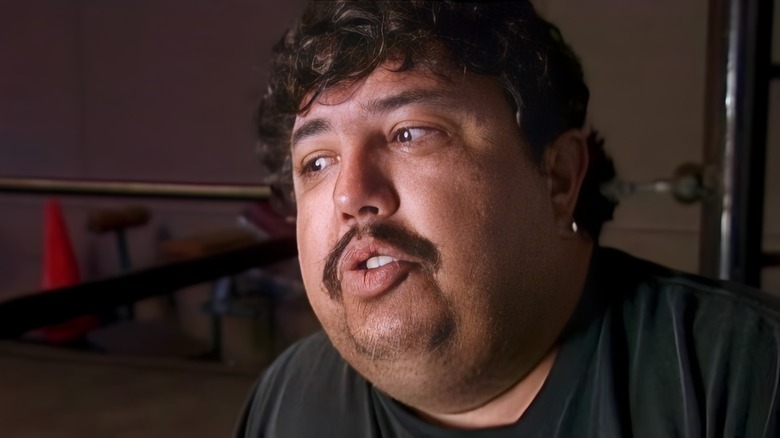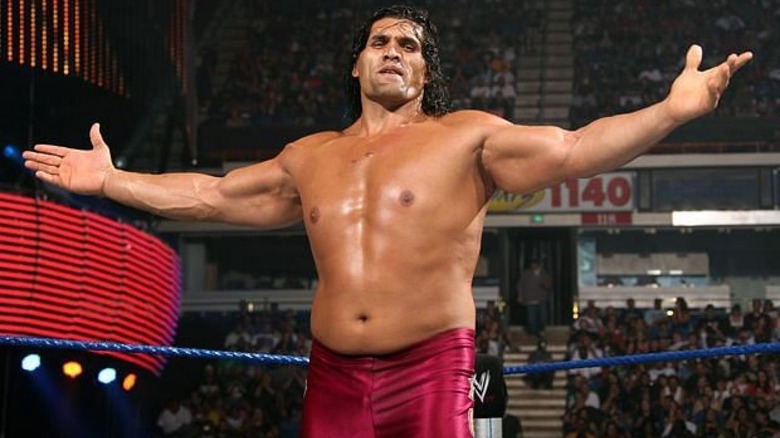The Tragic Story Of The Great Khali
In professional wrestling, fans are used to seeing men that would take up two seats on a regular-sized airplane. However, some men are so large, so enormous, that the only word fit enough to describe them as is great. The Great Khali does not have the reputation as a super worker, a man who could put on a five-star classic, or even being capable of having a great match with a broomstick, primarily because there is a very good chance that the broomstick would score an upset victory. But Dalip Singh Rana has been through his fair share of hardships during his 52 years on this planet, and some of them are a lot more serious and morbid than people might suspect.
While this feature could have been a lengthy think-piece on how the real tragedy of Khali's career was when he held the World Heavyweight Championship upside down, or how he is partly responsible for the existence of the Punjabi Prison Match, this exercise will chronicle the darker moments of Khali's life — the trials he had to battle through in order to be seen as one of India's most beloved sons. From life-changing conditions, to life-ending accidents, this is the tragic side of The Great Khali's life.
The Great Khali's Experiences with Acromegaly
A normal growth spurt for an average boy will usually see them grow several inches in a short space of time. This is followed by a continued period of slow growth during their late-teens, and eventually plateauing as they reach their early 20s. That did not happen to a young Khali.
Khali ended up suffering from Acromegaly, a disorder caused by excess hormones released by the pituitary gland after the growth plates have closed. This typically leads to the enlargement of certain areas of the body, with Khali's symptoms being gigantism and chin protrusion, hence why he ended up growing to a staggering seven-foot, one inches at an early age.
While this eventually gave Khali a look that struck fear into wrestlers across the world as he got into the business, Acromegaly can lead to serious health problems. Andre the Giant dealt with the same condition during his own tragic career. His untreated Acromegaly led to his premature death at the age of 46 in 1993, as the congestive heart failure that caused the heart attack that killed him in his sleep is a common symptom of the disorder.
Given his size, look, and his unusually deep voice for an eight-year old, Khali obviously stood out from the crowd while he was in school. Unfortunately, this led to him being bullied by other students, and even his own teacher, forcing him to move classes. However, circumstances in his family life led to a decision that would ultimately change Khali's life forever.
The Great Khali dropped out of school
The bullying from other children and teachers didn't help, but it was a financial decision that led to The Great Khali dropping out of school at the age of eight. In his book, "The Man Who Became Khali," the future WWE Superstar revealed his family's farm was what funded their livelihoods, but a monsoon in the summer of 1979 destroyed it, and the family didn't have enough money for the fees to repair it since their crops had dried up.
Once he had made the decision to drop out of school, Khali only had one thing on his mind: help provide for his parents. This decision was made before India's child labor laws were changed in 1986 thanks to the Child and Adolescent Labour (Prohibition and Regulation) Act, which prohibited anyone employing a child for work, even if it was intended to help out the family the child belonged to. However, Khali was no ordinary child, and could likely do more work than some laborers four-times older than him thanks to his size and youth.
Khali's father was made aware of a job on a nearby plantation by the family's account keeper, revealing that everyone who worked there would receive five Indian rupees per day, double what Khali's school fees were. Khali stated in his book that hearing about the wage was like hearing about a jackpot that could have been his, and would have gone far in helping his family, but there was one glaring problem with his idea...
His Family Didn't Want Him to Work
He might have been built like three eight-year olds stacked on top of each other, but the fact that The Great Khali was only eight meant that the family account keeper wasn't particularly happy about his idea of joining his father on the plantation. On top of this, Khali's father outright refused to listen to such a thought and was strictly against his son actually dropping out of school and working alongside him.
However, Khali was eventually given a chance to work on the plantation, and given how he spoke about the job in his book, it seemed like he enjoyed himself. "I had to work at the plant nursery, which was situated some 4km down the hill," he wrote. "I had to collect the plants, carry them on my back, travel uphill to the village for another 4km and plan them. Once all the trees were planted, I had to go back again and get more seedlings."
Impressed by what he saw, the family account keeper stayed true to his word and paid Khali his first five rupee note, a memory he still holds on to years later. "That moment is still fresh in my mind, as if it was only yesterday. It was an inexplicable feeling, something that till date counts as one of my happiest memories. My first earning! I was on cloud nine."
Khali never went back to school, and only began earning more money as he got older. He would go on to work as a security guard for a businessman in the city of Shimla, before going on to land a job as part of the Punjab Police in the 1990s. It was during this time where Khali would regularly hit the gym, and his dream of becoming a wrestler was underway.
The Great Khaki Was Originally Signed to WCW
On the surface, being signed to WCW seems tragic enough, particularly in 2000 when the company was being run so far into the ground it might have ended up reaching the earth's core with a bit more effort. The sad part of this story, for Khali at least, was that he never ended up making an appearance for the company, despite being under contract.
Khali had moved stateside to pursue his wrestling dream, and knowing full well that the lover of all things big and muscular, Vince McMahon, would have gone into cardiac arrest if he had laid eyes on the big man, WCW landed Khali's signature. Khali had been training at All Pro Wrestling under Roland Alexander, and had worked a few matches under his real name of Dalip Singh. He trained hard to try and catch the eye of WCW officials so he could get himself on TV, which in an alternate universe could have seen Khali giving overhand chops to Sting, Goldberg, and Hulk Hogan.
As most wrestling fans know, WCW was bought out by WWE in March 2001, and all of the guys and girls that worked there were out of a job seemingly overnight. Some stars would simply stay at home until their initial contracts expired, while others like DDP and Booker T were happy to go and work for WWE right away. The rest simply had to find other ways to make a living as their contracts wouldn't cover their day-to-day lives, with Khali falling into the third category. Khali would go back to continue his training at APW, but two months after the demise of WCW, a much more serious incident took place that could have ended Khali's career on the spot.
The Great Khali's perceived involvement in the death of Brian Ong
"I am actively working out to compensate lack of height, and it's been a dream of mine to have the millions chant for me, or even have them boo me. I like suicidal, homicidal, and genocidal aerial moves." That is a quote from Brian Ong's e-mail application to get into the All Pro Wrestling Boot Camp, in Hayward, California. Ong worked as a file clerk for the Deloitte consulting firm as a day job, and looked to be able to put all of that behind him and become a successful professional wrestler. That did not happen.
On May 28, 2001, Ong was practicing moves with The Great Khali, who at this point was looking to perfect his skills as a way for WWE and other international companies to notice him after the death of WCW. Both men were still very green and made mistakes like everyone did when they first started their wrestling training, but one mistake ended up costing Ong his life.
Accounts vary on who you ask. Some say that Ong and Khali were practicing a Flapjack, but due to Khali's height and both men's inexperience, Ong over-rotated and landed on his head. Others say that Ong's head bounced off the mat after a stiff powerbomb, while Susan Goldsmith of the East Bay Express reported in 2004 that Ong landed awkwardly off of a spinebuster, hitting his tailbone first and his head second. This report came from interviewing APW trainer Vince Principato, who said Ong didn't get up. Ong would later vomit, collapse, and be taken to St. Rose Hospital in Hayward, where he was pronounced dead on arrival at the age of 27, adding him to the list of pro wrestlers who've passed away in the ring.
The Great Khali's reaction to Brian Ong's death
The tragedy shook the wrestling world, especially in California as news started to spread. Brian Ong's death was caused by acute and subdural haemorrhage due to head trauma, according to the Alameda County Coroner's Office, but as his death was looked into further, it seemed as if this freak accident might have actually been somewhat preventable.
According to APW alumni Anthony "Tony" Jones in an interview with "HannibalTV," Ong had reportedly had a pre-existing condition that also led to his death. However, Jones didn't officially know the full details of what happened to him, as he was on tour in Japan at the time of the accident. Jones also revealed that The Great Khali was extremely sorry about the accident, and the big man has never spoken publicly about it outside of one interview with Opera News, revealing that he was shaken up and questioned his future in wrestling.
Ong had reportedly suffered a concussion early on into his training with APW, but one source close to the situation told Pro Wrestling Stories that Jones' claims of having a pre-existing condition were true, as he had been banned from several karate tournaments in his local area. The source stated that Ong purposely left out any information about his concussions on his APW application form. If the school and its trainers knew about it, they wouldn't have enroled him into the boot camp, or put him in the ring with someone like Khali.
APW Loses In Court
As many would expect given the situation, APW and The Great Khali were taken to court over Brian Ong's death. Ong's family filed a wrongful death lawsuit against APW, the company owner Roland Alexander, and Khali himself. However, due to it being an accident and Khali having no malice behind his actions, only APW and Alexander were targeted. The suit claimed that it was APW and the school's responsibility to protect Ong and they failed, disregarding his safety, and putting him at risk due to the previous concussion he had already suffered at the school.
Alexander refused to settle the case out of court due to Ong signing a waver that relieved the school of any mishaps, but the jury ruled in favor of the deceased's family. Depending on the source, the Ong family was rewarded anywhere between $1.3 million to over $2 million, with APW managing to stay in business due to Alexander being able to pass off other payments to cover the judgment, such as $500,000 from APW's liability judgment, and $200,000 from the school itself.
APW still runs shows to this day, now run by Markus Mack after Alexander passed away in 2013. According to the same source that revealed Ong's history of concussions, he died without a dime to his name, and had borrowed, loaned, and owed money for everything that he owned. The company's most famous event actually took place a few weeks after Ong's death, that being the 2001 King Of Indies tournament that featured the likes of AJ Styles, Samoa Joe, and the competition's eventual winner, Bryan Danielson. APW, and Khali, in the years that followed, would achieve success for years to come, but Ong never had the chance to achieve that glory.
The Great Khali Had To Have Brain Surgery To Save His Life
Remember when we said that Andre The Giant passed away due to not treating his Acromegaly? That almost happened to The Great Khali while he was signed to WWE.
In 2012, it was discovered that a tumor had developed on Khali's pituitary gland (the main part of the brain that caused his gigantism), and he needed brain surgery in order to remove it. Khali underwent a lengthy procedure in July of that year at the UPMC Presbyterian Hospital in Pittsburgh, Pennsylvania, to remove the tumor, which went successfully thanks to the work of neurosurgeon Dr. Joseph Maroon and his team.
By removing the tumor, Khali actually extended his life expectancy, as it eliminated certain side effects that can often lead to death for people suffering from Acromegaly in their 40s and 50s. After the surgery, Khali was supposed to give a few words to update WWE fans on how he was feeling and when he could get back in the ring. However, he declined to make any comments due to literally not being able to speak properly, as his nasal cavity was packed like a Christmas turkey.
In the years that followed his surgery, Khali would end up leaving WWE in 2014 at the end of his contract, making sporadic appearances in 2017 and 2018. He retired in 2018 after appearing at The Greatest Royal Rumble event in Saudi Arabia, and would later be honored with a spot in the WWE Hall of Fame in 2021. The Great Khali might not have had it easy during his life, but for fighting through everything he has been through, it's safe to say that he has earned the right to be considered great for the rest of his career.
